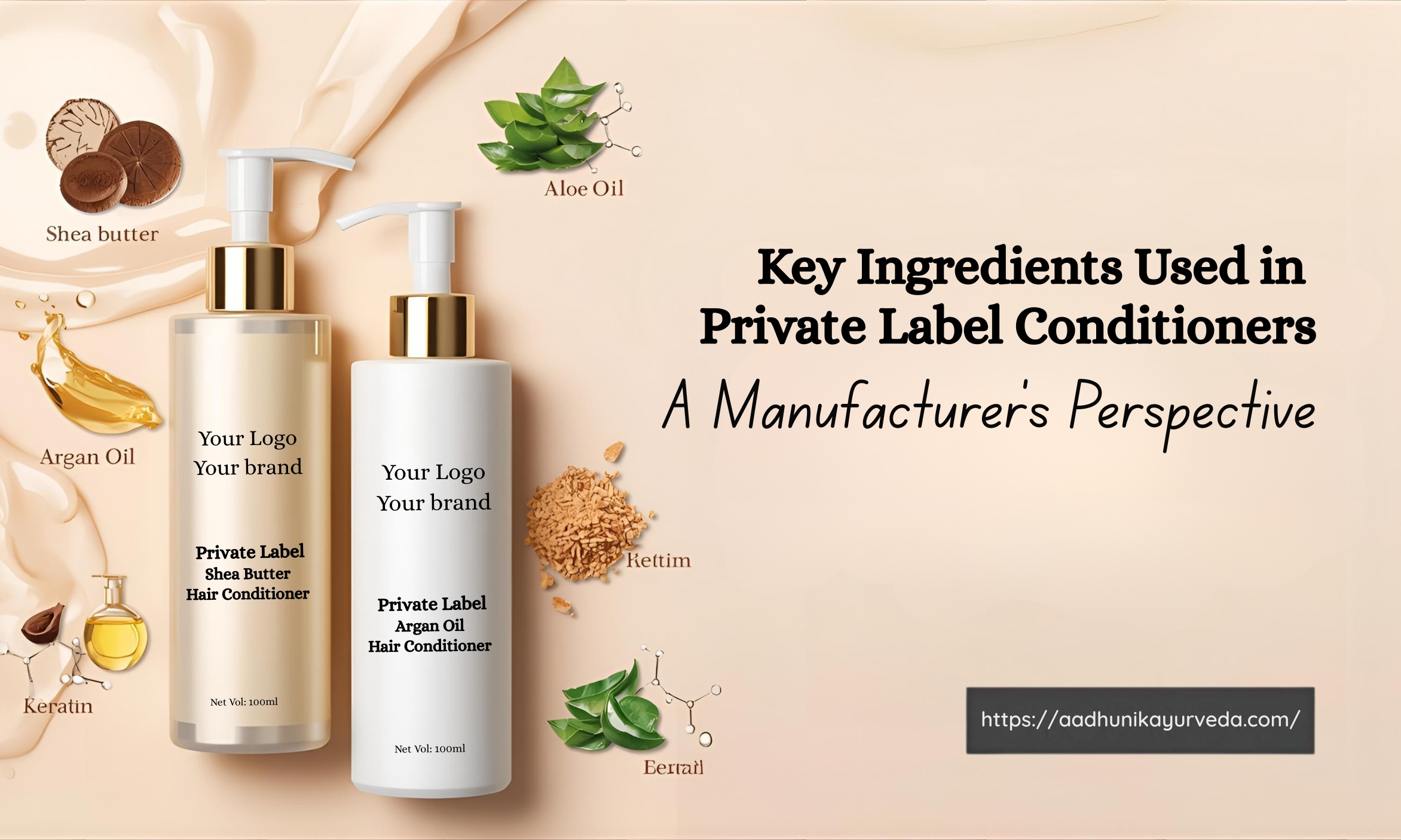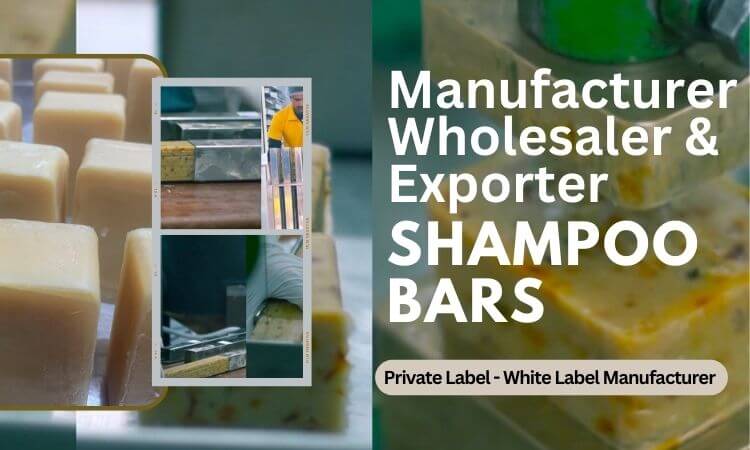
Key Ingredients Frequently Used in Private Label Conditioners: A Manufacturer’s Perspective
Understanding the Role of Ingredients in Conditioners | Ingredients Frequently Used in Conditioners | Private Label Conditioner Products Range | Trending & Effective Conditioner Ingredients in the Market | Customization for Private Label Brands | | ConclusionConditioners are more than just an after-wash product, they play a crucial role in maintaining hair health, softness, and manageability. While conditioners focus on cleansing, conditioners deliver nourishment, hydration, and protection, making them an indispensable part of every hair care routine. For private label brands, the choice of ingredients directly determines not only product performance but also consumer trust and brand value.
As a private label manufacturer, we ensure that conditioners are formulated with a balance of time-tested botanicals, modern actives, and safe, eco-conscious base ingredients. Our role extends beyond blending ingredients—we focus on quality sourcing, formulation innovation, and creating custom solutions that meet current and future market demands.
Understanding the Role of Ingredients in Conditioners
Conditioners differ from conditioners in purpose and formulation. While conditioners cleanse dirt and excess oil, conditioners replenish moisture, smoothen hair cuticles, reduce frizz, and make detangling easier.
Consumers today are increasingly looking for natural, plant-based, and organic conditioners that are free from silicones, parabens, and synthetic additives. This demand for “clean-label” and eco-conscious formulations pushes manufacturers to innovate with botanical extracts, seed oils, and natural proteins while ensuring performance and safety.
As a manufacturer, our role is to carefully balance nourishing oils, humectants, and proteins with stable bases so brands can deliver high-performing, consumer-trusted conditioners.
Ingredients Frequently Used in Conditioners
Here are some key ingredients we frequently use in private label conditioners, explained with benefits, why brands choose it, and manufacturer insight:
Aloe Barbadensis (Organic Aloe Vera) Leaf Juice
- Benefits: Deep hydration, scalp-soothing, strengthens hair roots.
- Why Brands Choose It: Natural appeal, trusted ingredient across global markets, ideal for scalp-sensitive products.
- Manufacturer Insight: We source pure, organic aloe that maintains bioactive compounds, ensuring formulations stay effective and stable.
Panax Ginseng (Organic Korean Ginseng) Extract
- Benefits: Stimulates scalp circulation, promotes stronger hair growth.
- Why Brands Choose It: Growing demand for adaptogens in hair care products.
- Manufacturer Insight: We standardize extracts for consistent potency, which helps brands position their conditioners as premium solutions.
Ginkgo Biloba (Organic Ginkgo) Leaf Extract
- Benefits: Improves scalp health, antioxidant-rich, reduces hair thinning.
- Why Brands Choose It: Aligns with “anti-aging hair care” market.
- Manufacturer Insight: We use eco-friendly extraction methods to ensure efficacy and compliance with natural product standards.
Salvia Officinalis (Organic Sage) Extract
- Benefits: Antimicrobial, strengthens roots, controls dandruff.
- Why Brands Choose It: Popular in herbal and ayurvedic-inspired formulations.
- Manufacturer Insight: Sage blends well with other botanicals, making it versatile for custom formulations.
Urtica Dioica (Organic Nettle) Leaf Extract
- Benefits: Reduces hair loss, strengthens follicles, adds volume.
- Why Brands Choose It: Traditional yet trending botanical for hair strengthening.
- Manufacturer Insight: We recommend nettle for scalp-focused conditioners, ensuring bioactive preservation during formulation.
Simmondsia Chinensis (Jojoba) Oil
- Benefits: Closely mimics scalp sebum, balances oil production, prevents dryness.
- Why Brands Choose It: Universally recognized, great for both oily and dry scalp formulations.
- Manufacturer Insight: As a stable oil, jojoba enhances shelf-life without compromising product texture.
Hydrolyzed Rice Protein
- Benefits: Strengthens hair shaft, adds volume, smoothens cuticles.
- Why Brands Choose It: Vegan protein alternative, clean-label appeal.
- Manufacturer Insight: We recommend it for lightweight conditioners targeting thin or fine hair.
Tocopherol (Vitamin E)
- Benefits: Antioxidant, reduces oxidative stress, supports scalp health.
- Why Brands Choose It: Appeals to “vitamin-enriched” conditioner trends.
- Manufacturer Insight: We use plant-derived Vitamin E for natural branding and label transparency.
Private Label Conditioner Products Range
As a manufacturer, we offer tailored private label products for brands based on market demand. Some of the most in-demand formulations include:
- Private Label Moisture-Rich Aloe & Shea Butter Conditioner
- Private Label Strengthening Ginseng & Rice Protein Conditioner
- Private Label Color-Safe Hibiscus & Vitamin E Conditioner
- Private Label Scalp-Care Sage & Nettle Conditioner
- Private Label Lightweight Jojoba & Green Tea Conditioner
- Private Label Volumizing Aloe Conditioner
- Private Label Herbal Blend Hemp & Rosemary Conditioner
Balancing Actives with Base Ingredients
Conditioner performance depends not only on active ingredients but also on the balance of emollients (like shea butter, natural oils), humectants (like glycerin, aloe), and proteins (like rice protein). Manufacturers ensure this balance for optimal texture, spreadability, and long-lasting effects.
Our approach includes stability testing, viscosity adjustments, and pH balancing to ensure that the conditioner remains safe, effective, and consistent from the first to the last use.
Trending & Effective Conditioner Ingredients in the Market
The current market is leaning heavily toward plant-based proteins (rice, quinoa, pea), adaptogens like ginseng and ginkgo, and nourishing oils such as flaxseed and jojoba. These ingredients meet consumer expectations for natural, sustainable, and performance-driven conditioners.
As a manufacturer, we help brands integrate trending actives without compromising stability, affordability, or scalability, making it easier to launch market-ready products that align with consumer preferences.
Customization for Private Label Brands
Every brand has unique positioning—whether it’s moisture-rich, strengthening, color-safe, or scalp-care focused. We provide complete customization options in ingredient selection, fragrance, texture, and packaging.
Storytelling around ingredients is equally important. For example, a hemp and aloe conditioner can be marketed as a hydrating herbal blend, while a ginseng and rice protein conditioner can be branded as a strengthening and revitalizing formula.
Manufacturer’s Insight
- Quality Sourcing: We partner with certified suppliers for pure, traceable raw ingredients.
- Regulatory Compliance: Formulations meet global standards and certifications like COSMOS, ECOCERT, and FDA.
- Scalable Production: From small-batch startups to large-scale enterprises, we provide flexible manufacturing solutions.
Conclusion
High-quality conditioners are built on carefully chosen, plant-based ingredients that deliver results and align with consumer demand for safe, natural products. As a private label manufacturer, our role is to not just formulate but to guide brands with innovation, sustainability, and market readiness.
FAQs:
Why should brands focus on natural ingredients in conditioners?
Natural ingredients not only appeal to consumer demand but also provide long-term benefits without harsh side effects, making them safer and more marketable.
Can private label manufacturers create silicone-free conditioners?
Yes, we formulate conditioners without silicones and replace them with natural alternatives like jojoba oil and hydrolyzed proteins for performance.
What makes hemp seed oil and ginseng popular in conditioners today?
Hemp seed oil provides deep nourishment, while ginseng stimulates growth, both align with trending “green beauty” and “adaptogen beauty” movements.
How do manufacturers ensure conditioner stability with natural ingredients?
We conduct stability, pH, and microbial testing while using natural preservatives to maintain product safety and consistency.
Can small businesses start their own conditioner line?
Absolutely. We offer scalable solutions so even startups can launch customized conditioners without heavy investment.



